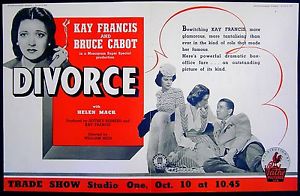The "horror" of Divorce (1945) is the topic of this film, which stars Kay Francis as Dianne Carter, a four-time divorcee who has just shed her latest husband, gaining both her freedom and a pot of money. Following the divorce, Dianne decides to return to her home town for a brief visit. When she arrives, she reconnects with her former boyfriend, Bob Phillips (Bruce Cabot), now a real estate professional, happily married to Martha (Helen Mack) and the father of two sons. But happiness is a relative term; once Dianne sets her cap for Bob, the marriage is doomed, and Martha has little recourse but to seek a divorce and try to start her life over.
Kay Francis starred in and produced this, the first of three pictures with Monograph Studios. Her contract with Warner Brothers was over, as was her work during World War II, and it seems that the idea of having more control over her films held some attraction (TCM article). Like the film, Allotment Wives, this picture uses a growing social issue to attract an audience. As the War ended, the number of divorces began to grow dramatically (see this article from the Washington Post), probably a result of the hasty marriages made during the war. Regardless of the actual reasons for the rapid increase, the film looks at divorce as an evil, with the character of Dianne as a predatory homewrecker. And while the plot is a bit simplistic, and some of the characters not entirely fleshed out, it does a decent job of setting a tone.
Though low budget, the film does recruit some strong actors, most notably Ms. Francis, whose performance gives a depth to the character of Dianne. The other excellent performance is that of Helen Mack. Her Martha is not a whimpering wife - Ms. Mack gives her a strength and pride that is not usual for the "loving wife" that she is being asked to play. Within the context of the divorce, she juxtaposes nicely with Dianne, who has built her finances with the settlements from her multiple marriages. Martha, on the other hand, refuses all monies from her husband, even child support - If Bob can not be an actual support for their children, she will work and support them both emotionally and financially. Her refusal to depend upon him both empowers her, and emasculates him.
Bruce Cabot, on the other hand, is a football, passed back and forth between the two women (interestingly symbolized by a football game early in the film, which Martha attempts with her two boys). Cabot's Bob is almost passive - first guided by his wife, then abruptly manipulated by his former girlfriend. That passivity makes it easy to understand why Dianne would even want him. He's quite a talented real-estate agent - Dianne sees both money and control in any relationship with him. According to the AFI catalog, Cabot was not the first choice for the role - it was originally earmarked for Paul Kelly (who would appear with Ms. Francis later that year in Allotment Wives).
The presence of Jerome Cowan, playing lawyer Jim Driscoll, is another added pleasure. We recently saw Mr. Cowan as the lecherous neighbor in My Reputation; his part here is not all that much bigger, but considerably more sympathetic. A character actor who brings veritas to any role that he plays, Mr. Cowan appeared on Broadway beginning in 1923, and would continue appearing on stage until 1959 (his final stage appearance was in Say, Darling). His work on Broadway led to his casting in Beloved Enemy (1936), starring Brian Aherne and Merle Oberon (Mr. Cowan took on the role of the villain of the piece). He worked continuously from then on - probably his most noted performance is that of Miles Archer in The Maltese Falcon (1941), but he was also excellent as one of Bette Davis' suitors in Mr. Skeffington (1944) and as the harried district attorney Thomas Mara in Miracle on 34th Street (1947). As the age of television began, he deftly moved into the medium, appearing as a guest star in such shows as The Twilight Zone, Perry Mason, and Bonanza. His final appearance was on an episode of Alias Smith and Jones in 1971. He died in January of 1972, survived by his two children and his wife of 43 year, Helen Dodge.
One other appearance worth noting is that of Larry Olsen, as Michael Phillips, the older of the two boys so devastated by their parents divorce. Mr. Olsen had a decent career as a child actor, but is bet remembered today as the older brother of Susan Olsen (of Brady Bunch fame). We will return again with another film from one of our favorite actresses.





No comments:
Post a Comment
Thanks for your interest in this blog. Your comments will be moderated to minimize spam to the website. Thanks for understanding.